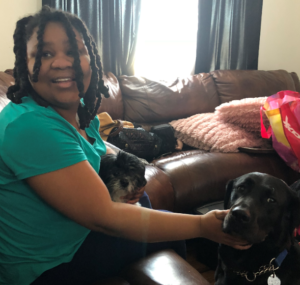The ADA Generation Speaks: Let’s Make ADA Education Part of the Core Curriculum
by Beth
I am pleased to introduce Raven Wilson as a guest blogger today. Raven is a 24-year-old graduate student at Northern Illinois University studying Vision rehab and assistive technology. A self-proclaimed nerd, she likes everything from Harry Potter books to Marvel movies — and lucky for us, she enjoys creative writing, too! Here she is with a thought-provoking reflection on the 30-year anniversary of the Americans with Disabilities Act.
by Raven Wilson

One morning in 2016, my friend group decided to try a delicious-sounding breakfast buffet. When we arrived at the entrance we were greeted with “I’m sorry, animals aren’t allowed in the restaurant area,” by the hostess. Her tone was friendly with an edge of boredom. Our group was blind at various levels and I was the only one with a guide dog.
”She’s a service animal,” I explained, trying to shrug off my nervousness. I tilted the handle of my dog’s working harness up slightly so the hostess could see it. She was unimpressed. “We can’t allow animals where people eat. It’s not healthy.”
So, it was going to be one of those situations.
My best friend had witnessed this before and jumped to my defense. “She’s a working dog and by law you have to let her into the restaurant.”
“I’ve never heard of a law like that. It’s hotel policy to not allow animals of any kind in the restaurant, but I can go get my manager to see what can be done,” the hostess said. Her demeanor had noticeably soured. We all waited as she disappeared into the restaurant and came back with the manager.
He told us the same thing as the hostess, and when our friend group explained that refusing a service animal that was not unclean or disruptive was against the ADA, the manager didn’t know what we were talking about. He ended up grudgingly letting me and my guide dog in.
By that point, I had been a guide dog handler for two years and had been in my fair share of refusal situations. Each one had one thing in common: those refusing me had little to no idea what the ADA was.
The Americans with Disabilities Act (ADA), is a law that mandates public facilities and institutions, as well as employers, provide reasonable accommodations for the disabled. It puts protections in place that work to erase discriminatory and exclusionary practices. While the enactment of the law and the subsequent amendments in 2008 have brought us leaps and bounds in terms of rights and opportunities, it’s not enough.
There is a serious lack of knowledge of the ADA. Either people misunderstand it (purposefully or otherwise) or they have only heard about it in passing if at all. Students study about the constitution and the bill of rights, the emancipation proclamation and Civil rights act (sometimes), but not the ADA. Employees get little to no training on the ADA, and employers seem to only know enough to avoid expensive sanctions. Those who do know about the ADA and are acting in good faith appear lost when it comes to implementing it in real-world situations.
What’s even more troubling is how many disabled people know little to nothing about the ADA. Until I became a guide dog handler, I hadn’t heard much about it. None of my vision teachers had sat me down to discuss the laws that affect me. My first encounter with the ADA was during my first refusal as a handler. I was terrified. I didn’t know enough about my rights to defend myself, so I ended up leaving. Others are in the same boat, and having to leave a public place you deserve access to is one of many consequences of disabled people not knowing their rights and how to fight for them.
Reflecting on the 30-year anniversary of the ADA, I know we have a lot of work to do. The first step is more exposure and education. I imagine course units and even entire classes about Disability history. I imagine competencies in both the ADA and IDEA (Individuals with Disabilities Education Act) being included as an expanded core curriculum standard for disabled students. I imagine a standardized ADA certification program for employers and employees in every sector that explores the ADA through a reflective, layered lens and offers up tools for implementing accommodations and non-discriminatory practices in real-world situations.
I long for a future where I can mention the ADA, and everyone knows what I’m talking about. I long for a future where, if I’m being denied my rights, passersby will come to my defense with full knowledge of the ADA. And most of all, I long for a future where disabled people and their allies don’t have to invoke the name of the ADA — because disabled people having rights to equal access and accommodations will be treated as irrefutable fact.






